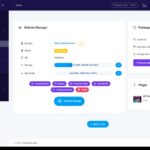
How to Start a Business as a Website Agency
If you have a passion for web design and development, and you want to turn it into a profitable business, then this blog post is for you. In this post, we will share some tips and steps on how to start a business as a website agency, from finding your niche and setting your rates, to marketing your services and managing your projects.
Step 1: Find Your Niche
One of the first things you need to do before starting a business as a website agency is to find your niche. A niche is a specific segment of the market that you can target with your services. For example, you can specialize in creating websites for restaurants, lawyers, e-commerce, etc. Finding your niche will help you stand out from the competition, attract your ideal clients, and showcase your expertise.
To find your niche, you can start by doing some market research. You can look at what other website agencies are offering, what kind of clients they are working with, and what kind of problems they are solving. You can also look at the demand and trends in the web design industry, and see what kind of websites are popular and profitable. You can also use your own skills and interests as a guide. For example, if you have a background in graphic design, you can focus on creating websites that are visually appealing and user-friendly.
Step 2: Set Your Rates
Another important step in starting a business as a website agency is to set your rates. Your rates are the amount of money you charge for your services, and they can vary depending on several factors, such as the scope and complexity of the project, the value you provide, the market demand, and the competition.
There are different ways to set your rates as a website agency. You can charge by the hour, by the project, or by the value. Charging by the hour means that you charge a fixed amount for every hour you work on the project. Charging by the project means that you charge a fixed amount for the whole project, regardless of how long it takes. Charging by the value means that you charge based on the value or results that you deliver to the client.
Each method has its pros and cons, and you need to choose the one that works best for you and your clients. For example, charging by the hour can be simple and transparent, but it can also limit your earning potential and discourage efficiency. Charging by the project can be more profitable and predictable, but it can also be risky if you underestimate the time and resources needed. Charging by the value can be rewarding and satisfying, but it can also be challenging to quantify and justify.
To set your rates, you need to do some calculations and research. You need to calculate your expenses, such as taxes, software, equipment, etc., and your desired income, such as how much money you want to make per month or year. You also need to research what other website agencies are charging in your niche and location, and what kind of value they are providing. You can use these data to determine a fair and competitive rate that covers your costs and meets your goals.
Step 3: Market Your Services
The next step in starting a business as a website agency is to market your services. Marketing is the process of promoting and selling your services to potential clients. Marketing is essential for any business, especially for a website agency, because it helps you build awareness, credibility, and trust among your target audience.
There are many ways to market your services as a website agency. Some of the most effective methods are:
- Creating a portfolio website: A portfolio website is a website that showcases your previous work and testimonials from satisfied clients. A portfolio website is like a resume for website agencies. It helps you demonstrate your skills, style, and value to potential clients.
- Networking: Networking is the act of connecting with other people in your industry or niche who can help you grow your business. Networking can help you find referrals, collaborations, partnerships, mentors, etc. You can network online or offline, through social media platforms like LinkedIn or Facebook groups or events like meetups or conferences.
- Blogging: Blogging is the act of writing and publishing articles on topics related to web design and development. Blogging can help you establish yourself as an authority and expert in your niche. It can also help you attract organic traffic from search engines like Google or Bing.
- Social media: Social media is the use of platforms like Instagram or Twitter to share content and interact with your audience. Social media can help you increase your visibility, reach, and engagement with potential clients.
- Email marketing: Email marketing is the use of email to communicate with your subscribers or leads. Email marketing can help you build relationships with potential clients who have shown interest in your services.
- Advertising: Advertising is the use of paid channels like Google Ads or Facebook Ads to display your services to targeted audiences. Advertising can help you generate leads quickly and effectively










